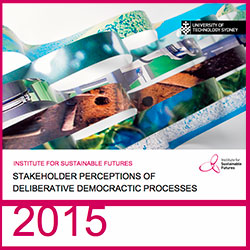The Institute for Sustainable Futures (ISF), University of Technology, Sydney. The newDemocracy Foundation conducted a Citizens’ Policy Jury on the issue of a safe and vibrant nightlife in Sydney during early 2014. The Jury is an example of a deliberative democracy approach that gives citizens a chance to participate directly in decision-making about policy issues....Continue reading
Research Papers
Deliberative Methods for Complex Issues: A typology of functions that may need scaffolding
Author: Thomas Jordan, Department of Sociology and Work Science, Gothenburg University, 2013. Abstract: When a group of diverse stakeholders face a complex issue that needs to be managed skillfully, the group may need support in order to work effectively. A large number of methods for scaffolding group deliberation on complex issues has evolved over the...Continue reading
Public participation in decision making: a three step procedure
Authors: Ortwin Renn, Thomas Webler, Horst Rakel, Peter Dienel and Branden Johnson (Policy Sciences 26: 189-214, 1993) Abstract: This report introduces a novel model of public participation in political decisions, based on three simple steps.
Challenging futures of citizen panels
Authors: Mann, C.; Voß, J.-P.; Amelung, N.; Simons, A.; Runge, T.; Grabner, L.: Innovation in Governance Research Group, Department of Sociology, Technische Universität (TU) Berlin Abstract: This report emerged from the workshop “Challenging futures of citizen panels”, held by the Innovation in Governance Research Group on April 26, 2013, at the Berlin-Brandenburg Academy of Sciences and...Continue reading
God Does Not Play Dice, But People Should: Random Selection in Politics, Science and Society
Authors: Bruno S. Frey, CREMA & Lasse Steiner, University of Zurich March 1, 2014 – University of Zurich, Department of Economics, Working Paper No. 144 Abstract:This paper discusses and proposes random selection as a component in decision-making in society. Random procedures have played a significant role in history, especially in classical Greece and the medieval...
Decision accuracy in complex environments is often maximized by small group sizes
Authors: Albert B. Kao and Iain D. Couzin, Department of Ecology and Evolutionary Biology, Princeton University Abstract Individuals in groups, whether composed of humans or other animal species, often make important decisions collectively, including avoiding predators, selecting a direction in which to migrate and electing political leaders. Theoretical and empirical work suggests that collective decisions...Continue reading
The Australian Citizens’ Parliament and the Future of Deliberative Democracy
Edited by Lyn Carson, John Gastil, Janette Hartz-Karp, and Ron Lubensky Growing numbers of scholars, practitioners, politicians, and citizens recognize the value of deliberative civic engagement processes that enable citizens and governments to come together in public spaces and engage in constructive dialogue, informed discussion, and decisive deliberation. This book seeks to fill a gap...Continue reading
The 43rd Parliament: Traits and Trends
RESEARCH PAPER, 2013–14 2 October 2013 A short statistical analysis of the people who form our Parliament by educational, occupational and demographic background. Full Research Paper
Accidental Politicians: How Randomly Selected Legislators Can Improve Parliament Efficiency (2011)
Mathematical research indicates that parliaments work best when some, though not all, members are chosen at random Marc AbrahamsThe Guardian, Tuesday 17 April 2012 Democracies would be better off if they chose some of their politicians at random. That’s the word, mathematically obtained, from a team of Italian physicists, economists, and political analysts. The team...Continue reading
A Handbook on Citizens’ Juries with particular reference to health care
Author: Mooney. G. (2010) Honorary Professor, University of Sydney, Australia; Honorary Professor of Health Economics, University of Cape Town, South Africa; and Visiting Professor, Aarhus University, Denmark and the University of New South Wales, Australia. AbstractThis book is aimed primarily at health service staff in Australia interested in running a citizens’ jury in health care....Continue reading

